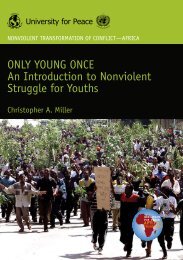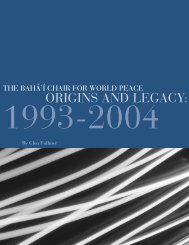who medicines strategy - libdoc.who.int - World Health Organization
who medicines strategy - libdoc.who.int - World Health Organization
who medicines strategy - libdoc.who.int - World Health Organization
Create successful ePaper yourself
Turn your PDF publications into a flip-book with our unique Google optimized e-Paper software.
WHO MEDICINES STRATEGY 2004-2007 | 34EO 1.4Human resources capacity increasedin the pharmaceutical sectorthrough education and trainingprogrammes to develop capacityand to motivate and retainpersonnel in sufficient numberswithin a clearly defined andorganized structureRationaleEffective <strong>medicines</strong> policy implementation canonly be achieved when appropriate numbers ofwell-trained and motivated pharmaceutical staffare employed and functioning in an efficientway. Motivation arises as a result of an effectivepolicy, a clear understanding of the rationale andobjectives of the policy, adequate remunerationfor work, well-defined roles and responsibilities,and clear standards for performance.ProgressIn 2002 alone, WHO support to countriesincluded the training of nearly 900 healthprofessionals in: <strong>medicines</strong> regulation, qualityassurance, and anti-counterfeit activities; rationaluse of <strong>medicines</strong> by health professionals; publicsector <strong>medicines</strong> supply; national <strong>medicines</strong>policy development and monitoring; the impactof trade agreements on access to <strong>medicines</strong>;<strong>medicines</strong> financing and pricing; improving<strong>medicines</strong> use by consumers; and establishmentof pharmaceutical norms and standards 9 . Thesetraining programmes were held in all six WHOregions, in English, French, and Spanish.Challenges remainingIn many countries, policy implementation isconstrained by the lack of sufficient numbers ofadequately trained and motivated pharmaceuticalstaff and difficulties in retaining trained staff. Insome sub-Saharan countries there are less than10 pharmacists in the public service. In addition,other health professionals are not adequatelyeducated about the essential <strong>medicines</strong>concept, which is central to understandingand implementing a national <strong>medicines</strong> policy.Although WHO offers a number of trainingcourses, the challenge is to ensure that coursesare <strong>int</strong>egrated <strong>int</strong>o larger strategies to build humancapacity in pharmaceuticals, that appropriateparticipants are identified and selected, and thatthey receive follow-up support.Meeting the challenges 2004-2007Over the next four years WHO will:> provide technical assistance to governmentswith severe staff shortages to help themaddress key policy issues (including supportin the development of strategies to train andretain pharmaceutical staff and to improve theknowledge of all health professionals in theconcept of essential <strong>medicines</strong>).> work with universities to ensure the<strong>int</strong>egration of the essential <strong>medicines</strong> conceptin curricula for health professionals.> maximize the impact of WHO trainingcourses through: ensuring that courses fit <strong>int</strong>obroader strategies to increase human resourcecapacity in pharmaceuticals; courses arefocused on relevant topics, regularly updated,and available in the appropriate languages;participants are carefully selected and receivefollow-up support.











